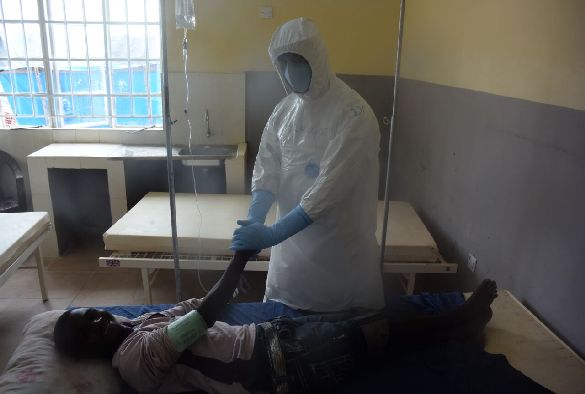
The first donations of plasma, from survivors of the Ebola epidemic in Sierra Leone, have been given to patients at an Ebola Treatment Unit in Freetown Sierra Leone.
The team, is led by scientists at the University of Liverpool and colleagues at the 34th Regiment Military Hospital and Ministry of Health, Freetown Sierra Leone.
Dr Calum Semple, from the University’s Institute of Child Health, and his consortium of European and American collaborators developed a convalescent plasma protocol in readiness for an outbreak, such as Ebola, as part of the outbreak preparatory work by the International Severe Acute Respiratory and Emerging Infection Consortium (ISARIC).
Protective antibodies
The study is one of several being supported by the Wellcome Trust’s platform for evaluating experimental Ebola therapeutics in West Africa.
Dr Semple said: “Convalescent plasma therapy has been used since 1891 to treat severe diseases. We want to find out whether Ebola survivor’s plasma contains protective antibodies and if their plasma can be used safely to reduce the number of deaths in this and future outbreaks.”
People who have survived Ebola develop antibodies in their blood, which appear to protect them from repeated infection. These antibodies will be given to Ebola patients in a plasma transfusion to help them fight the infection. As a result of the current outbreak, there are now a substantial number of Ebola survivors.
Volunteers
Mr Yusuf Kabba, President of the Sierra Leone Association of Ebola Survivors, said: “This study is appreciated by the survivors who are the source of voluntary donors. This is an African solution for an African problem. It could save many lives and serve as a National resource for the future outbreaks of Ebola.”
While the principle of plasma or ‘serum’ therapy is well established, blood and plasma from recovered Ebola patients has only been used in a limited number of patients. During the 1995 Ebola outbreak in Kikwit, in the Democratic Republic of the Congo (DRC), seven out of eight patients receiving convalescent whole blood survived. Whether this was due to the transfusions or to other factors, however, is unclear.
The use of convalescent plasma is being studied in all three of the West African countries affected by Ebola. Sierra Leone has been the worst affected country. The study in Sierra Leone was established by Dr Semple by pooling resources from a sister study in Guinea, led Dr Johan van Griensven of the Institute of Tropical Medicine Antwerp and a study in Liberia led by Dr David Hoover of ClincalRM.
Lockdown
Dr Janet Scott, clinical lead from the University of Liverpool’s Institute of Translational Medicine, said: “All of our plasma donors are well and enthusiastically encouraging others to come forward. It has taken a huge amount of work from all the teams; bood bank staff worked through the lockdown to make this donation programme a success.”
The project is also funded by the Ohio based Clinical Research Management Inc (ClinicalRM) under a grant from the Bill & Melinda Gates Foundation and supported by the World Health Organization (WHO); the International Severe Acute Respiratory and Emerging Infection Consortium (ISARIC); and international collaborations across the public, private and not-for-profit sectors to tackle the Ebola emergency.
The research consortium also involves investigators from the University of North Carolina; Duke University; Institute of Tropical Medicine in Antwerp; the London School of Hygiene and Tropical Medicine; the University of Oxford; the University of Edinburgh; Liverpool School of Tropical Medicine; the Charité Institute of Tropical Medicine and International Health, Berlin; Public Health England; and the NHS Blood and Transplant Service.